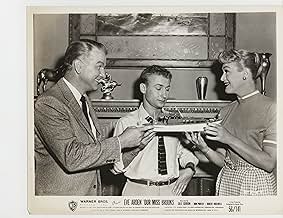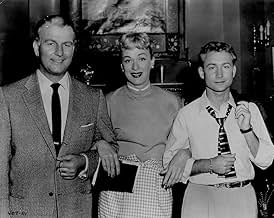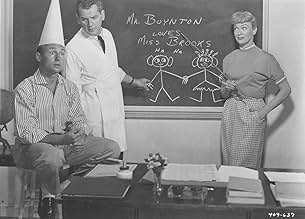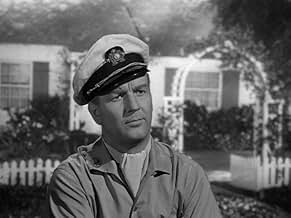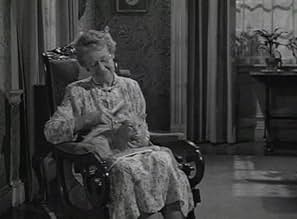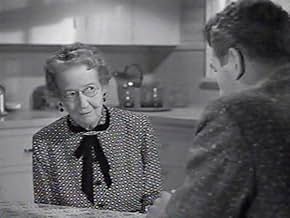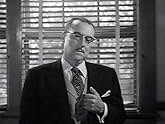Füge eine Handlung in deiner Sprache hinzuFollows the story of an English teacher that flusters the principal and flirts with a colleague.Follows the story of an English teacher that flusters the principal and flirts with a colleague.Follows the story of an English teacher that flusters the principal and flirts with a colleague.
Gloria McMillan
- Harriet Conklin
- (as Gloria MacMillan)
Joseph Kearns
- Mr. Stone
- (as Joe Kearns)
David Alpert
- Realtor
- (Nicht genannt)
Marjorie Bennett
- Mrs. J. Boynton
- (Nicht genannt)
June Blair
- Miss Lonelyhearts
- (Nicht genannt)
Leo Curley
- Realtor
- (Nicht genannt)
Joseph Forte
- Nolan's Butler
- (Nicht genannt)
Creighton Hale
- Faculty Member
- (Nicht genannt)
Empfohlene Bewertungen
This film came out right after the cancellation of the popular TV series in 1956. The writers (from the original series) completely ignored the fact that the TV show underwent a major format change in it's last season. Miss Brooks went to work in an elementary school following the demolition of Madison High. This change never completely worked and the series was cancelled. That said, this feature tells the story, from the beginning, of Miss Brooks arriving in Madison, meeting and moving in with Mrs. Davis, and progressing in her romance with Mr. Boynton over a period of months. There is a secondary romantic subplot interjected with Don Porter, and the film unfolds with virtually the entire cast from the beloved series. The Warner Bros. designed sets closely approximate the ones fashioned at Desilu for the TV show, and Minerva the cat (played by the same cat from the 1950 comedy "Rhubarb") gets ample screen time. Fans of the series and even those who have never seen it or heard the many radio episodes out there will enjoy this funny, gentle story of Connie Brooks and her co-horts.
Is this disappointing because the passage of time has given the TV (1952-56), and especially the radio (1940s) series a nostalgic glow they don't deserve? I don't know, but the movie is only mildly amusing in spots -- much of it is a bore -- while I recall the radio series with pleasure.
The nature of the plot line is quite different from both of the broadcast series, partly because the movie feels it needs to wrap up a story cleanly. In the series -- sort of like a movie serial -- the characters are left largely as we found them at the start of an episode -- Miss Brooks panting for the indifferent Mr. Boynton, Osgood Conklin fuming about his daughter's interest in the bumbling Walter Denton, who in turn is contemplating his next (mis)adventure. Denton is the one who's most changed in the movie. He was the main character in the radio shows, getting into one scrape after another (ala Andy Hardy), with Miss Brooks usually intervening in some way to bail him out. I don't recall the beginning of the radio series, but it seems that Connie Brooks had been at the school forever -- as had Denton, for that matter -- not a new arrival as in the movie. This is an interesting period piece, but not really good entertainment.
The nature of the plot line is quite different from both of the broadcast series, partly because the movie feels it needs to wrap up a story cleanly. In the series -- sort of like a movie serial -- the characters are left largely as we found them at the start of an episode -- Miss Brooks panting for the indifferent Mr. Boynton, Osgood Conklin fuming about his daughter's interest in the bumbling Walter Denton, who in turn is contemplating his next (mis)adventure. Denton is the one who's most changed in the movie. He was the main character in the radio shows, getting into one scrape after another (ala Andy Hardy), with Miss Brooks usually intervening in some way to bail him out. I don't recall the beginning of the radio series, but it seems that Connie Brooks had been at the school forever -- as had Denton, for that matter -- not a new arrival as in the movie. This is an interesting period piece, but not really good entertainment.
I remember the TV series "Our Miss Brooks," though it's possible I saw it in syndication. 1952 is a little early, even for me.
After the show was canceled, this film was made, completely ignoring the fact that Brooks had moved on to an elementary school. We go back to her arrival at Madison High, meeting Mr. Boynton, etc. We also have a subplot involving a student (Nick Adams) and his wealthy father (Don Porter).
I love seeing Richard Crenna playing the teen-aged Walter Denton - he went on to so much good work in TV and film. Eve Arden plays Miss Brooks the way unmarried women were played in those days -- desperate to get married. Arden always had that wry delivery that served her well in this role. Despite wanting to nab Mr. Boynton, the character of Connie Brooks is a good teacher and an independent woman, dedicated to her work and students.
Robert Rockwell, Gale Gordon, and the rest of the TV cast is on board. Few people realize that Robert Rockwell worked into the mid-'90s, and if you recall the Werther's candy commercial with the attractive white-haired man giving his grandson Werther's, that was him.
Nice trip down nostalgia lane. It was a more innocent time for sure.
After the show was canceled, this film was made, completely ignoring the fact that Brooks had moved on to an elementary school. We go back to her arrival at Madison High, meeting Mr. Boynton, etc. We also have a subplot involving a student (Nick Adams) and his wealthy father (Don Porter).
I love seeing Richard Crenna playing the teen-aged Walter Denton - he went on to so much good work in TV and film. Eve Arden plays Miss Brooks the way unmarried women were played in those days -- desperate to get married. Arden always had that wry delivery that served her well in this role. Despite wanting to nab Mr. Boynton, the character of Connie Brooks is a good teacher and an independent woman, dedicated to her work and students.
Robert Rockwell, Gale Gordon, and the rest of the TV cast is on board. Few people realize that Robert Rockwell worked into the mid-'90s, and if you recall the Werther's candy commercial with the attractive white-haired man giving his grandson Werther's, that was him.
Nice trip down nostalgia lane. It was a more innocent time for sure.
WHEN THIS THEATRICAL movie hit the local theatre screens in 1956, the CBS Network powerhouse sitcom was long over the hill and heading toward its eternal reword in Sitcom Heaven. Ignoring the old axiom of "If it ain't broke, don't fix it!", those in charge at CBS decided to revamp the series with unnecessary changes of venue (different school), setting (City & state) and cast characters.
WELL, THERE HAD certainly been enough popularity and appeal left in this now "venerable" CBS Radio/Television and someone had the brainstorm to bring its story and original characters to the big screen of our local theaters. Disdaining the changes that had been foisted on us in the waning days of the series, the theatrical version of OUR MISS BROOKS brought the story back to Connie Brooks' arrival at Madison High School and her meeting with Mr. Boynton, Mrs. Davis, Walter Denton, Mr. Conklin, Harriet Conklin, "Stretch" Snodgrass, .....etc.
ADDED TO THE original gang and story-line was a sort of subplot involving Mr. Conklin's running for office of Educational rep and the introduction of Don Porter as widower and well to do newspaper publisher (and potential suitor) Lawrence Nolan. Then Warner Brothers contract player, Nick Adams, portrayed son of the rich guy, Gary Nolan.
ALL THINGS CONSIDERED, the picture was a successful 1950's style comedy that did a great job in closing the OUR MISS BROOKS story with a "....And They Lived Happily Ever After!" fairy tale ending.
THE FILM ALSO gave us a chance to see the members of the supporting cast at their very best. These players are: Gale Gordon (Mr. Conklin), Jane Morgan (Mrs. Davis), Richard Crenna (Walter Denton),Gloria McMillan (Harriet Conklin)and Leonard Smith (Stretch Snodgrass). Robert Rockwell (Mr. Boynton) was perhaps shown to the best as he was allowed to show much of his yet unseen abilities.* Also, before we forget, cameo by lovely, statuesque and non-speaking, uncredited actress is really June Blair; formerly Playboy Magazine's "Playmate of the Year for 1957, as well as the future Mrs. David Nelson ADVENTURES OF OZZIE & HARRIET).
TAKING THE TIME to screen this theatrical film version of OUR MISS BROOKS will prove to be time not wasted by anyone.
NOTE: * The part of Mr. Phillip Boynton on the radio version was portrayed by one Ira Grossel; who would change his name to Jeff Chandler and pursue a most successful, but all too abrupt film career. But whoever was to play the very naive Biology teacher would have to be taller than average; as Miss Eve Arden was, herself, a very tall woman.
WELL, THERE HAD certainly been enough popularity and appeal left in this now "venerable" CBS Radio/Television and someone had the brainstorm to bring its story and original characters to the big screen of our local theaters. Disdaining the changes that had been foisted on us in the waning days of the series, the theatrical version of OUR MISS BROOKS brought the story back to Connie Brooks' arrival at Madison High School and her meeting with Mr. Boynton, Mrs. Davis, Walter Denton, Mr. Conklin, Harriet Conklin, "Stretch" Snodgrass, .....etc.
ADDED TO THE original gang and story-line was a sort of subplot involving Mr. Conklin's running for office of Educational rep and the introduction of Don Porter as widower and well to do newspaper publisher (and potential suitor) Lawrence Nolan. Then Warner Brothers contract player, Nick Adams, portrayed son of the rich guy, Gary Nolan.
ALL THINGS CONSIDERED, the picture was a successful 1950's style comedy that did a great job in closing the OUR MISS BROOKS story with a "....And They Lived Happily Ever After!" fairy tale ending.
THE FILM ALSO gave us a chance to see the members of the supporting cast at their very best. These players are: Gale Gordon (Mr. Conklin), Jane Morgan (Mrs. Davis), Richard Crenna (Walter Denton),Gloria McMillan (Harriet Conklin)and Leonard Smith (Stretch Snodgrass). Robert Rockwell (Mr. Boynton) was perhaps shown to the best as he was allowed to show much of his yet unseen abilities.* Also, before we forget, cameo by lovely, statuesque and non-speaking, uncredited actress is really June Blair; formerly Playboy Magazine's "Playmate of the Year for 1957, as well as the future Mrs. David Nelson ADVENTURES OF OZZIE & HARRIET).
TAKING THE TIME to screen this theatrical film version of OUR MISS BROOKS will prove to be time not wasted by anyone.
NOTE: * The part of Mr. Phillip Boynton on the radio version was portrayed by one Ira Grossel; who would change his name to Jeff Chandler and pursue a most successful, but all too abrupt film career. But whoever was to play the very naive Biology teacher would have to be taller than average; as Miss Eve Arden was, herself, a very tall woman.
Using students to raise funds for the Principal running for office? That doesn't sound ethical, by today's standards. LOVE Eve Arden, the English teacher in "Miss Brooks". My favorite role is when she is Joan Crawford's sidekick in "Mildred Pierce". She never really got her man in films, and thirty years later, Arden is now the principal in "Grease". In the film version of "Our Miss Brooks", she is the English teacher at the local high school, trying to spur a student on. Gale Gordon is the Principal, and his role is actually pretty toned down from all those episodes in "Lucy". The story takes some left and right turns, but it ends up being all about finding Miss Brooks a husband. I had always thought the film came first, but apparently this was released right at the end of the TV series. Here, life would imitate art... Nick Adams plays the troubled student, and would overdose at age 36. It's pretty good, if you just go along for the ride. Not her best role, but not her worst. Directed by Al Lewis, who had written and directed the TV series. Eve did mostly TV shows after this.
Wusstest du schon
- WissenswertesThis movie was released about two weeks before the final episode of the TV series on which it was based aired. In the final (4th) season, the show was overhauled and many of the regular characters were dropped (although some came back during the season). Miss Brooks and Mr. Conklin moved to a private elementary school in the San Fernando Valley. The movie ignored all this and all the original regular characters were back at Madison High School for the conclusion of the Brooks-Boynton courtship. Perhaps 30 years later, the final season of the TV show would have been dismissed as a "dream."
- PatzerWhen Mr Conklin tries to come aboard Mr Nolan's yacht, he steps on a rung of the ladder, which breaks. In the next shot, as he falls in the water, all rungs of the ladder are in place, none broken.
- Zitate
Mrs. Margaret Davis: I hate to see you like this, dear. Can't we do something to cheer you up?
Connie Brooks: Yeah. When I get back from school, we can play Russian roulette.
- VerbindungenReferenced in In Bed with Madonna (1991)
- SoundtracksIt's Magic
(uncredited)
Music by Jule Styne
Lyrics by Sammy Cahn
Performed by Richard Crenna
[Walter sings the song while he plays the ukelele]
Top-Auswahl
Melde dich zum Bewerten an und greife auf die Watchlist für personalisierte Empfehlungen zu.
- How long is Our Miss Brooks?Powered by Alexa
Details
- Erscheinungsdatum
- Herkunftsland
- Sprache
- Auch bekannt als
- Наша мисс Брукс
- Drehorte
- Produktionsfirma
- Weitere beteiligte Unternehmen bei IMDbPro anzeigen
- Laufzeit1 Stunde 25 Minuten
- Farbe
- Seitenverhältnis
- 1.37 : 1
Zu dieser Seite beitragen
Bearbeitung vorschlagen oder fehlenden Inhalt hinzufügen

Oberste Lücke
By what name was Our Miss Brooks (1956) officially released in India in English?
Antwort

